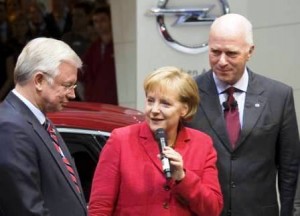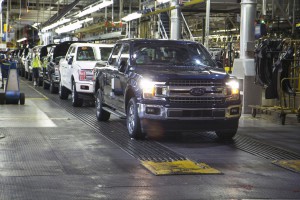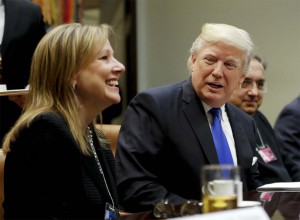The auto industry has been actively trying to get President Donald Trump to back off his threat to impose a 25% tariff on imported automobiles, even Detroit-based carmakers warning that such a move could wind up raising prices, slowing sales, reducing U.S. exports and hurting American jobs.
Ironically, one of the likely alternatives to new tariffs could be great news for American consumers – but a potential disaster for Detroit’s Big Three, opening them up to a new wave of competition in the most profitable segment of the U.S. automotive market.
German Chancellor Angela Merkel, among others, has raised the prospect of effectively eliminating automotive tariffs entirely, while others are saying they should be a uniform figure shared among all major trading partners. That approach could force the U.S. to eliminate the so-called “chicken tax,” the relic of an old, Euro-American trade dispute that has effectively closed off the American pickup truck market for the past half-century.
In 1964, President Lyndon decided to fight back when France and West Germany put hefty tariffs on American-raised poultry. He countered with 25% duties on a variety of European goods, including potato starch, brandy – and light trucks. Over the years, most of the tariffs have been lifted, but the 25% duty on imported trucks remains, and it isn’t just limited to vehicles produced in Europe but covers the entire world.
(Every car sold in the U.S. is an “import.” Click Here for the story.)
Domestic automakers have long defended the restriction and, from their viewpoint, for good reason. Pickups, especially full-size models like the Ford F-Series, are Detroit’s most profitable models. According to Adam Jonas, the lead automotive analyst at Morgan Stanley, the F-Series will generate about $42 billion in revenue this year, and yield more than $10 billion in earnings before interest and taxes, or EBIT – or net incomes estimated at around $6.5 billion.
“By revenues” alone, Jonas wrote in a June note to investors, “we estimate the F-Series franchise places Ford at #72 on the Fortune 500 list. In terms of profitability, the F-Series ranks well inside the top 50 companies in the U.S.” Measured another way, the F-Series alone is more profitable than McDonald’s Corp., 3M Co. or United Technologies.
The situation isn’t much different at General Motors, and Fiat Chrysler Automobiles is equally dependent upon its Ram pickup line-up to bolster its bottom line.
Arguably eliminating, or at least sharply reducing, tariffs on American-made vehicles would help domestic manufacturers, as well as foreign car companies that have set up “transplant” assembly lines in the U.S. In fact, BMW currently is the largest exporter of American-made vehicles from its Spartanburg, South Carolina plant, with Mercedes-Benz and Honda also high on the list.
How Detroit’s Big Three would make out is uncertain, a number of analysts questioning whether there would be much of a foreign market created for anything but specialty vehicles, such as the Ford Mustang, which is already one of the Motor City’s biggest auto exports.
Full-size pickups likely wouldn’t gain much momentum on the export market, analysts caution, noting that vehicles such as the Ford F-150 and Chevy Silverado are simply too large for most global consumers, with limited demand coming from a few Latin American markets and the Middle East.
(Click Here to see how “nearly every segment of auto industry” is threatened by Trump trade tactics.)
On the other hand, the risk is that by dropping tariff barriers, foreign producers could subsequently try to tap the lucrative U.S. market for big pickups, the only remaining vehicle segment still overwhelmingly dominated by Detroit. Volkswagen hinted that it might be interested in entering the pickup market when it showed off the Atlas Tanoak Concept during the New York Auto Show last April.
Gaining a foothold wouldn’t be easy. The two foreign brands currently competing in the full-size segment – Toyota with the Tundra, and Nissan with the Titan – have gained relatively little ground despite investing billions. Full-size truck buyers have traditionally been the U.S. market’s most loyal owners.
But by shifting production to countries like Mexico, China or even Thailand, were low labor costs could be translated into big discounts on pricing, that equation could change. There have been rumors circulating among industry insiders for several years that Chinese automakers might try to target the pickup segment in their bid to finally enter the U.S. market. Eliminating the chicken tax would play right into their hands.
Lower prices could help drive up demand, though most observers don’t expect to see massive growth in sales of full-size pickups, which typically account for around 11 to 13% of total unit sales in the U.S. More likely the result would be the sort of price-cutting that would cut deeply into earnings.
Detroit makers have shown a willingness to put plenty of cash on the hood, if need be, to shore up sales and market share, as TheDetroitBureau.com reported just a month ago. When a factory run by a key Ford supplier was hit by a massive fire, briefly forcing the carmaker to shut down much of its F-Series production, competitors moved “to ratchet up incentives on the current models to go after weakness at Ford,” noted Jeff Schuster, the head of forecasting for LMC Automotive.
GM and FCA, in particular, also wanted to empty out lots of old 2018 models as they prepared to introduce all-new 2019 versions of their full-size trucks. Ford fought back, reportedly offering discounts of up to $12,000 on some F-150 models, while FCA had incentives running as high as $16,000 on some versions of the Ram 1500.
(To see more about how Trump’s potential auto tariffs are getting a global pushback, Click Here.)
With the huge margins on their full-size trucks, automakers could afford the occasional price war, but givebacks like that aren’t sustainable, however, at least not unless Detroit automakers can find an alternative to replace the earnings from their most profitable models. And if the chicken tax were to go away, encouraging new entrants from abroad, they might have no other option.



